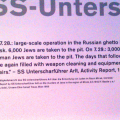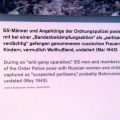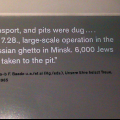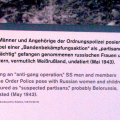Why Belarus is Missing in World War II History

Belarusian ruler Alexander Lukashenka frequently refers to the Second World War in his quarrels with the West. Lukashenka added to the Soviet Victory Day celebrated on 9 May another official holiday, 3 July, the day when the Red Army took Minsk in 1944. In 2003 the government introduced the History of the Great Patriotic War as an obligatory and separate subject not only in schools but also at all universities. The authorities are also building a new grand museum devoted to the war.
The attitude to the role and suffering of Belarus elsewhere in Europe is different. Although only a fraction of Russian territory had been occupied by the Germans, they exploit their victory to the fullest extent possible even now. Belarus had been the main Nazi-Soviet battleground for years, but many in the West also prefer to label Belarusian territories and its people as "Russian". It may sound simpler to them, but to Belarusians this sounds unfair to say the least.
Do Belarusian victims exist for Western historians?
Today the Russian authorities exploit the Soviet victory in the war against Nazi Germany and neglect the fact that the war touched just a very small part of Russia. The war devastated the non-Russian lands of the Soviet Union and in particular Belarus, which saw the most fierce and prolonged fighting. No wonder, when Belarus was sandwiched between Soviet Russia and Nazi Germany in 1939. German troops occupied the land at the very beginning of the war and the Nazis retained the Belarusian territory for three years.
As a result, literally every Belarusian village saw at least some fighting at the beginning and end of the war. Many regions suffered as the frontline stayed there for many months, or partisan activities resulted in brutal collective punishment on behalf of the German administration. There is no Belarusian family which did not suffer in the war directly. This was certainly not the case in Russia, only a fraction of which was actually occupied.
It is common to hear or read in Russia and in the West the western territories of the USSR called “Russian” Read more
However, even now, two decades after the collapse of the Soviet Union, it is common to hear or read in Russia and in the West the western territories of the USSR being called “Russian.” No need to go far to see evidence of it. The museum on Nazi terror in the centre of Berlin names the residents of Belarus “Russians”.
This photo gallery from Berlin's Topography of Terror museum, located on the site of the former Nazi secret police Gestapo headquarters, demonstrates the unfortunate habit of many western historians of labelling "Russian" anything to the east of Poland. These are hardly innocent typos, as Moscow continues to exploit the guilty conscience of Germans.
(pictures by YK)
The human losses in Belarus were immense, but the exact extent is still a hotly disputed topic. A prominent leader of Soviet Belarus Piatro Masherau, a former partisan himself, considered that every fourth Belarusian died in the war. Lukashenka increased that number to every third. Yet there is evidence that around 1.9 million Belarusians, or 20 per cent of the pre-war population of the land, perished in the war. 500,000-600,000 of them were killed in the Red Army in combat, and more than a million civilians were murdered by Nazis and their collaborators. Most of those killed were Jews and peasants exterminated in anti-guerrilla operations.
Partisan Land?
Myths related to the Second World War were at the core of Soviet Belarusian ideology. The local Communist party presented the land as a “guerrilla country”. It was a safe form of Belarusian nationalism: it allowed them to portray Belarusians as heroes but it did not lead to a confrontation with the painful issues of Soviet policies carried out in Belarus.
Belarusians fought both for Soviet partisan groups and pro-German police and military units Read more
The guerrilla warfare in Belarus did not inflict many military losses but caused immense civilian losses. Ultimately, it became an internal confrontation as Belarusians fought both for Soviet partisan groups and pro-German police and military units. For many of them it was not a free choice but rather a choice between the Gulag and the Buchenwald. People in western Belarus in particular had no sympathy for Moscow because they became Soviet citizens only in 1939, after the Nazi Germany and the Soviet Union divided Europe in accordance with the Molotov-Ribbentrop Pact.
Many questions remain unanswered about “partisan” Belarus. No doubt Belarusian partisans were more successful in their operations than their counterparts in other countries. Belarusian partisans fought under much harsher conditions than the Yugoslav fighters of Tito because Belarus – unlike the Balkans – was crucial to the German war effort.
Only in the eastern regions which had been part of the Soviet Union since the October Revolution was there a wide-scale indigenous guerrilla movement, albeit with strong control from Moscow. In the western half of Belarus there were mostly partisans which were sent or parachuted from Soviet-controlled areas, who were effective and well-trained commandos.
The Second World War remains a hot issue in Belarus
Belarusian history of the Second World War hides yet another skeleton in the closet – people who cooperated with the German administration in Belarus. There were very few, if any, true supporters of the Nazis. This can be seen clearly by the lack of support for the massacres of Jews in Belarus. Nazis themselves complained that Belarusians, unlike other European nations, were not enthusiastic about their anti-Jewish policies.
many people were willing to ally with anyone struggling against the Stalinist regime Read more
But many people were willing to ally with anyone struggling against the Stalinist regime. And when late in the winter of 1944 Nazis allowed the organisation of the Belarusian Land Defence Forces, tens of thousands of people joined that army. It was a very impressive number as the mobilisation took place only in Central and North-Eastern Belarus.
Those people began to cooperate with Germans, ready to fight against the return of the Stalinist terror. They were poorly armed and Germans had no trust in them and never used them on the front lines. These battle units, later repeatedly reorganised, led to the eventual formation of a Belarusian SS Division which did not participate in any massacres. The Nazi leadership decided to send them to fight in Western Europe and as soon as they had a chance most of them joined the French partisans. Their fate symbolises the tragic choice between bad and worse faced by Belarusians in that war.
Today Belarusians have almost no anti-German or anti-Western sentiments. Belarusian writer Siarhiej Dubaviec recently noted that all opinion surveys show Germany as the favourite country for emigration among Belarusians, despite all the official glorification of the Soviet anti-Nazi struggle in 1941-45.
A major Belarusian publisher once admitted that all books on the last war, even scholarly titles are selling better than any other books Read more
Soviet Belarus had no relations of its own with the rest of Europe to discuss their common history. Independent Belarus very soon returned to the old Soviet ideology which considered the history of the Second World War as a compelling argument to support confrontation with the West.
The war remains an issue for Belarusians, including those who are sceptical of the official propaganda. A major Belarusian publisher once admitted that all books on the last war, even scholarly titles, sell better than any other books.
Belarus and Germany should address their history, acknowledge the facts of Belarusian suffering and the contradictions in Belarusians' attitude towards the German occupation. The current government of Belarus will never do so as it undermines its raison d'etre. But Germany as a democratic European state must do so. And they should work with Belarusian society directly and give it still further grounds to challenge the anti-Western rhetoric of the regime.









